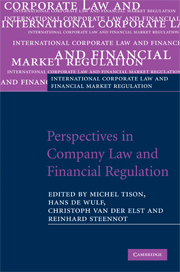Book contents
- Frontmatter
- Contents
- List of contributors
- Foreword
- PART I Perspectives in company law, SECTION 1: European company law: regulatory competition and free movement of companies
- PART 1 Perspectives in company law, SECTION 2: Corporate governance, shareholders' rights and auditing
- 9 Stakeholders and the legal theory of the corporation
- 10 The renaissance of organized shareholder representation in Europe
- 11 In search of a middle ground between the perceived excesses of US-style class actions and the generally ineffective collective action procedures in Europe
- 12 Some modest proposals to provide viable damages remedies for French investors
- 13 Pre-clearance in European accounting law – the right step?
- 14 International standards on auditing and their adoption in the EU: legal aspects and unsettled questions
- 15 Corporate governance: directors' duties, financial reporting and liability – remarks from a German perspective
- 16 Some aspects of capital maintenance law in the UK
- 17 Luxembourg company law – a total overhaul
- 18 Role of corporate governance reform and enforcement in the Netherlands
- PART 1 Perspectives in company law, SECTION 3: Takeover law
- PART II Perspectives in financial regulation, SECTION 1: European perspectives
- PART 2 Perspectives in financial regulation, SECTION 2: Transatlantic perspectives
- PART III Miscellaneous
- Index
- References
9 - Stakeholders and the legal theory of the corporation
from PART 1 - Perspectives in company law, SECTION 2: Corporate governance, shareholders' rights and auditing
Published online by Cambridge University Press: 04 August 2010
- Frontmatter
- Contents
- List of contributors
- Foreword
- PART I Perspectives in company law, SECTION 1: European company law: regulatory competition and free movement of companies
- PART 1 Perspectives in company law, SECTION 2: Corporate governance, shareholders' rights and auditing
- 9 Stakeholders and the legal theory of the corporation
- 10 The renaissance of organized shareholder representation in Europe
- 11 In search of a middle ground between the perceived excesses of US-style class actions and the generally ineffective collective action procedures in Europe
- 12 Some modest proposals to provide viable damages remedies for French investors
- 13 Pre-clearance in European accounting law – the right step?
- 14 International standards on auditing and their adoption in the EU: legal aspects and unsettled questions
- 15 Corporate governance: directors' duties, financial reporting and liability – remarks from a German perspective
- 16 Some aspects of capital maintenance law in the UK
- 17 Luxembourg company law – a total overhaul
- 18 Role of corporate governance reform and enforcement in the Netherlands
- PART 1 Perspectives in company law, SECTION 3: Takeover law
- PART II Perspectives in financial regulation, SECTION 1: European perspectives
- PART 2 Perspectives in financial regulation, SECTION 2: Transatlantic perspectives
- PART III Miscellaneous
- Index
- References
Summary
Introduction
It is a pleasure for me to write for the lively Eddy, always full of a variety of fertile thoughts, combining eloquence with rapidity. He has worked and published many learned treatises on the law of corporations and the field of finance, which has become more and more integrated in the study of corporations. This is because the capital markets need the producers of their ‘deal objects’ and continuously try to reshape these objects according to their wishes. For Eddy, I shall endeavour to go off the beaten track in search of a better theory of the corporation. My proposal also contains an incomplete inventory of areas where the science of corporate law is somewhat mired down.
Phenomenological analysis
The notion of a ‘stakeholder’
When I am unsure about the exact meaning of a word like ‘stake’, I consult the Oxford English Dictionary, bearing in mind that a mad professor has made many contributions to it.
A ‘stake’ is essentially a pole to which something is attached; historically, it might be a convicted person condemned to death by fire or other means, but when I hear ‘stakeholder’ I initially think of a situation of gaming where an independent party holds the prize money. This meaning is then extended to a person who holds an interest or concern in something, especially a business.
- Type
- Chapter
- Information
- Perspectives in Company Law and Financial Regulation , pp. 165 - 182Publisher: Cambridge University PressPrint publication year: 2009
References
- 1
- Cited by



